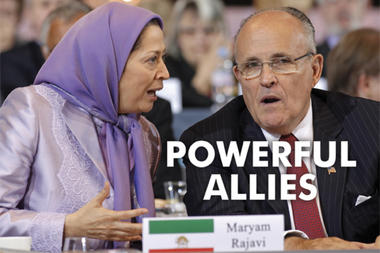| In an article for “the Atlantic” Wendy Kaminer uncovers that by advocating this organization, these politicians and former high-ranking officials would be regarded as human rights activists, by means of which they find loopholes in paying taxes. |
 On Sunday NY Times revealed the extraordinary efforts of US politicians to reverse the terrorist designation of the group, the Mujahedeen Khalq, and proved that those efforts were all responded by huge sums of money.
On Sunday NY Times revealed the extraordinary efforts of US politicians to reverse the terrorist designation of the group, the Mujahedeen Khalq, and proved that those efforts were all responded by huge sums of money.
In an article for “the Atlantic” Wendy Kaminer uncovers that by advocating this organization, these politicians and former high-ranking officials would be regarded as human rights activists, by means of which they find loopholes in paying taxes.
What do the tax dodges of billionaires and the advocacy efforts of former high-ranking officials on behalf of a designated terrorist group have in common (aside from their exposure on the front page of the Sunday New York Times)? They exemplify the extraordinary legal privileges enjoyed by economic and political elites.
Ronald Lauder, a legacy member of the upper reaches of the top 1 percent, legally avoids paying millions of dollars in taxes through extravagant use of loopholes available only to the super-rich, according to the Times. Prominent politicos, from former Bush Administration officials to Howard Dean, engage in the lucrative business of lobbying for the Mujahedeen Khalq (M.E.K.), a "fringe Iranian opposition group, long an ally of Saddam Hussein, that is designated as a terrorist organization under United States law," the Times reports.
At a conference in Paris last December, Rudy Giuliani and several major Bush administration officials held a public conference in Paris. There Mr. Giuliani told Maryam Rajavi: “These are the most important yearnings of the human soul that you support, and for your organization to be described as a terrorist organization is just simply a disgrace.” Addressing a militant Iranian exile group that the U.S. government has designated a terrorist organization, of course.
In doing so they run no apparent risk of being prosecuted under material support provisions of federal anti-terrorism law, enjoying an extra-legal privilege the Times does not report: Last year the Supreme Court rejected a First Amendment challenge to material support bans, ruling that they may be used against human rights advocates who counsel designated terrorist groups in peaceful conflict resolution.
The gross inequities of federal taxation are frequently critiqued by mainstream pundits and politicians; the discriminatory use of vague and far-reaching federal anti-terror laws is targeted mostly by civil libertarians who exert tragically little influence on policy. David Cole exposed the arbitrary, inconsistent enforcement of material support laws in a January 2011 New York Times op-ed that highlighted the illegal but effectively immunized M.E.K. lobbying efforts of Michael Mukasey, Rudy Giuiliani, and other prominent, right wing anti-terror warriors.
Mukasey and Giuliani, et al, responded in the National Review, claiming un-persuasively that laws prohibiting peaceful human rights work by David's Cole's client (the Humanitarian Law Project) on behalf of one designated terrorist group simply did not apply to their work on behalf of another. They claimed additionally that the designation of M.E.K. as a terrorist group is inaccurate, but as they must know, the arguable inaccuracy of a designation is legally irrelevant: The law does not allow for lobbyists and other citizens to substitute their judgments for the judgments of State Department officials. That the State Department is sometimes wrong, that terrorist watch lists are arbitrary and inaccurate, is not a defense for violating the law; it's a strong argument for amending it, which Mukasey and company oppose. Why should they support amending a law criminalizing political speech that their status allows them to evade, and perhaps apply to their political enemies?
It's not fair to attribute this self-entered vision of justice to political and economic elites exclusively. Millions of middle class taxpayers as well as the very rich naturally tend to support tax laws that work to their advantage. Millions of politically unconnected voters offer general support for expansive anti-terror laws, partly out of ignorance about their contents and partly in the risky belief that the most repressive or intrusive provisions will not be applied to them. "How does the law serve me" is an understandable and useful question, but it's a treacherous one for people concerned with redressing inequality. While we understand laws most viscerally by experiencing their effects on us, justice requires attending, as well, to their effects on others.
